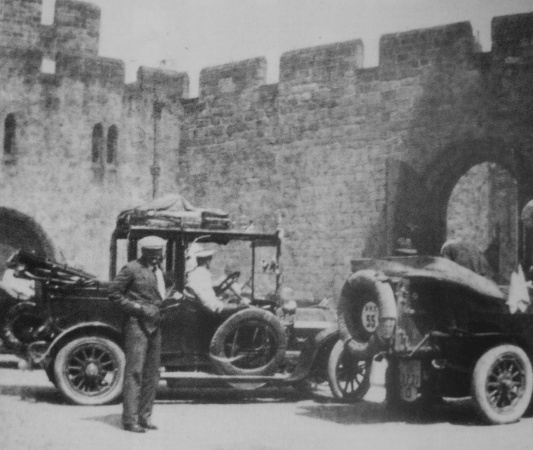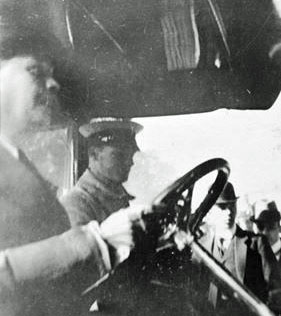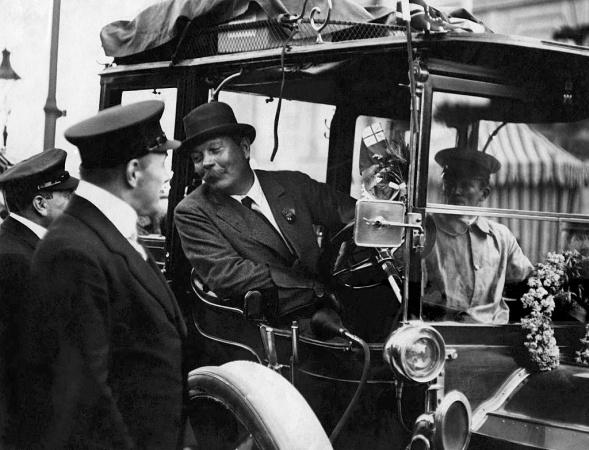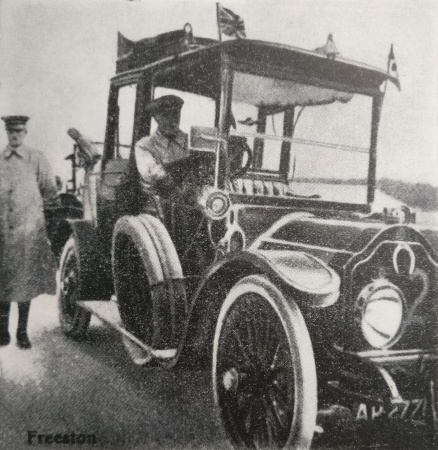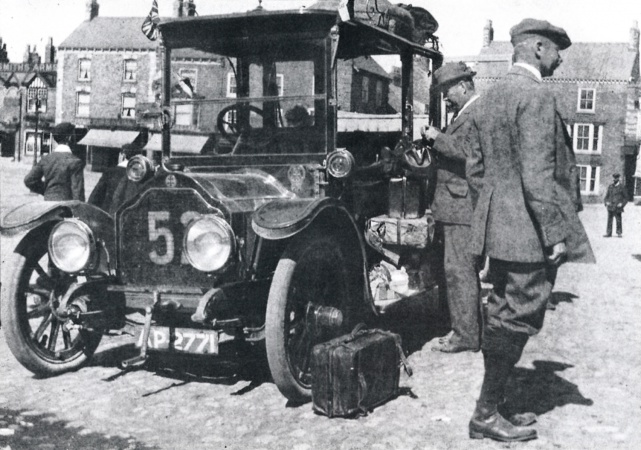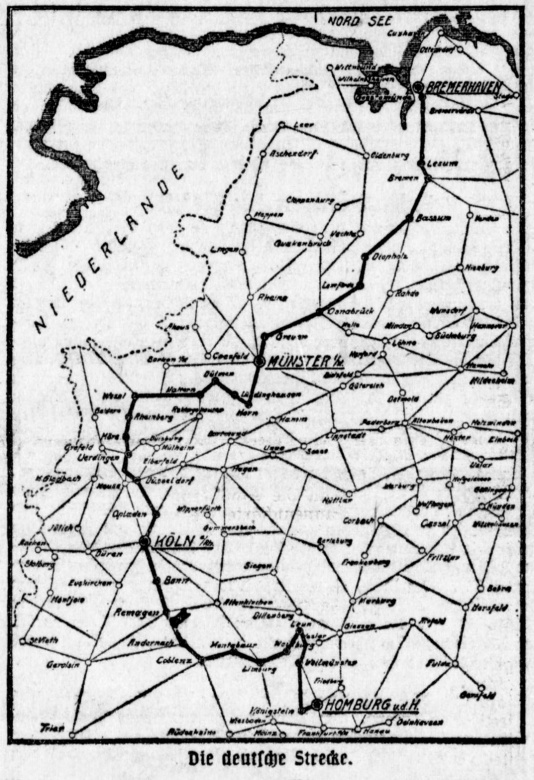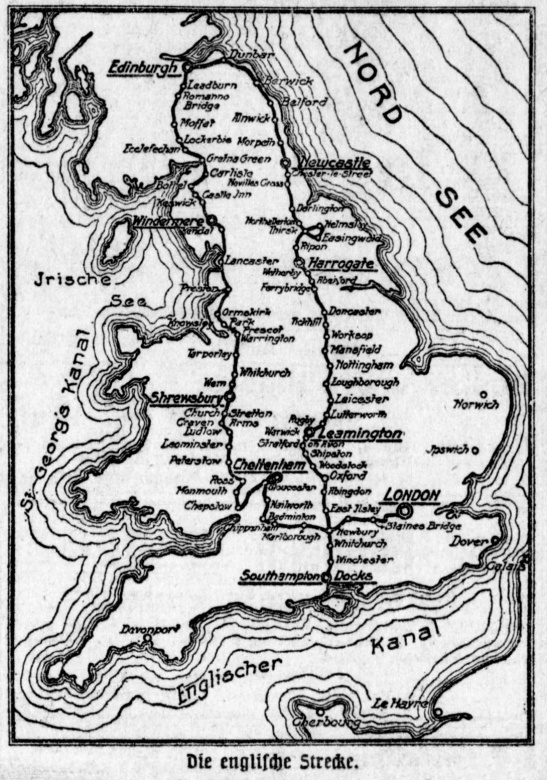The Prince Henry Tour

The Prince Henry Tour was an automobile race organized by Prince Henry (Prinz Albert Wilhelm Heinrich von Preußen, 1862-1929). This tour was a gesture of sporting good will in honour of King George V's coronation. Prince Henry participated to the tour himself. 37 German cars from the Kaiserlichter Automobil-Klub (mostly Opel, Benz and Mercedes, with 70-80 horse-power) versus 28 British cars from the Royal Automobile Club.
Sir Arthur Conan Doyle was one of the drivers for the British team (as No. 52 with his laundelette Dietrich-Lorraine [1]). Each entrant had to drive his own car so Conan Doyle was driving his green 16 horse-power Dietrich-Lorraine which was called Billy as the surname of his daughter Lena Jean, and with a horse shoe stuck on the front as a mascot [2]. Each car had to carry an observer from the opposite country: an army or navy officer. Conan Doyle was hence accompanied by Count Carmer, Rittmeister of Breslau Cuirassiers. Jean Conan Doyle was also present and sitted in the open tonneau. It was said that, each morning during the race, Count Carmer used to put flowers in Jean's corner [3]. A chauffeur mentioned but not named by Conan Doyle, is mentioned as Alfred Stiller in the back of the car in Russel Miller biography [4].
The race started from Homburg (Germany) on 4 july 1911 and ended in London (UK) on 19 july 1911. See route map.
The British team won the race. The trophy was an ivory statue of a young lady with the word "peace" engraved below [5]. The two teams joined in toasting the Kaiser at the Royal Automobile Club.
Photos with Conan Doyle
Conan Doyle's souvenirs
In The German War
Three years after the race, Arthur Conan Doyle wrote in his book The German War (1914) his souvenirs of the British-German entente during the race and how he felt the signs of the coming war:
« ... it is of interest now to remember some of the conversations to which I listened three years ago, when I was a competitor in the Anglo-German motor competition, called the Prince Henry Tour. It was a very singular experience, and was itself not without some political meaning, since it could hardly have been chance that a German gunboat should appear at Agadir at the very instant when the head of the German Navy was making himself agreeable (and he can be exceedingly agreeable) to a number of Britons, and a genial international atmosphere was being created by the nature of the contest, which sent the whole fleet of seventy or eighty cars on a tour of hospitality through both countries. I refuse to believe that it was chance, and it was a remarkable example of the detail to which the Germans can descend. By the rules of the competition a German officer had to be present in each British car and a British officer in each German one during the whole three weeks, so as to check the marks of the driver. It was certainly an interesting situation, since every car had its foreign body within it, which had to be assimilated somehow with the alternative of constant discomfort. Personally we were fortunate in having a Rittmeister of Breslau Cuirassiers, with whom we were able to form quite a friendship. Good luck to you, Count Carmer, and bad luck to your regiment! To you also, little Captain Türck, Fregattencapitän am dienst, the best of luck, and ill betide your cruiser! We found pleasant friends among the Germans, though all were not equally fortunate, and I do not think that the net result helped much towards an international entente.
However, the point of my reminiscence is that on this tour I, being at that time a champion of Anglo-German friendship, heard continual discussions, chiefly on the side of British officers, several of whom were experts on German matters, as to when the impending war would be forced upon us. The date given was always 1914 or 1915. When I asked why this particular year, the answer was that the German preparations would be ready by then, and especially the widening of the Kiel Canal, by which the newer and larger battleships would be able to pass from the Baltic to the North Sea. It says something for the foresight of these officers that this widening was actually finished on June 24 of this year, and within six weeks the whole of Europe was at war. I am bound to admit that they saw deeper into the future than I did, and formed a truer estimate of our real relations with our fellow-voyagers. "Surely you feel more friendly to them now," said I at the end to one distinguished officer. "All I want with them now is to fight them," said he. We have all been forced to come round to his point of view. »
In Memories and Adventures
In his auto-biography, Memories and Adventures (1923), Arthur Conan Doyle also related the event in two chapters.
In chapter XXVI. The Eve of War :
« One of my most remarkable pre-war experiences, which influenced my mind deeply, was my participation in the amateur motor race called the Prince Henry Competition. It was rather a reliability test than a race, for the car had to go some 150 miles a day on an average at its own pace, but marks were taken off for all involuntary stoppages, breakdowns, accidents, etc. Each owner had to drive his own car, and I had entered my little 16 horse-power landaulette. There were about forty British cars and fifty German, so that the procession was a very considerable one. Starting from Homburg, the watering-place, our route ran through North Germany, then by steamer to Southampton, up to Edinburgh and back to London by devious ways.
The competition had been planned in Germany, and there can be no doubt in looking back that a political purpose underlay it. The idea was to create a false entente by means of sport, which would react upon the very serious political development in the wind, namely, the occupation of Agadir on the south-west coast of Morocco, which occurred on our second day out. As Prince Henry, who organized and took part in the competition, was also head of the German Navy, it is of course obvious that he knew that the Panther was going to Agadir, and that there was a direct connection between the two events, in each of which he was a leading actor. It was a clumsy bit of stage management and could not possibly have been effective.
The peculiarity of the tour was that each car had an officer of the army or navy of the other nation as a passenger, to check the marks. Thus my wife and I had the' enforced company for nearly three weeks of Count Carmer, Rittmeister of Breslau Cuirassiers, who began by being stiff and inhuman, but speedily thawed and became a very good fellow. The arrangements were very peculiar. Some British paper—the "Mail" if I remember right—had stated that the Competition was really a device to pass a number of German officers through Great Britain in order to spy out the land. I think there may have been some truth in this, as our good Count when we reached London went off to a hotel down in the East End, which seemed a curious thing for a wealthy Junker to do. This criticism seems to have annoyed the Kaiser, and he said—or so it was reported—that none but junior officers should go as observers. I should think that ours was the senior of the lot, and the others were mostly captains and lieutenants. On the other hand, the British Government, out of compliment to Prince Henry, had appointed the very best men available as observers. If there had been a sudden crisis over Agadir, and Germany had impounded us all, it would have been a national disaster and would have made a difference in a European war. Speaking from an imperfect memory, I can recall that we had General Grierson, Charles Munro, Rawlinson, I think, Captain—now General—Swinton of Tanks fame, Delme Ratcliffe, Colonel—now General—Holman, Major—now General—Thwaites, and many other notables both of the Army and Navy.
From the first relations were strained. There was natural annoyance when these senior officers found that their opposite numbers were youngsters of no experience. Then, again, at Cologne and Munster I understand that the German military did not show the proper courtesies, and certainly the hospitality which the whole party received until we reached England was negligible. The Germans themselves must have felt ashamed of the difference. Personally the competitors were not a bad set of fellows, though there were some bounders among them. We were not all above criticism ourselves.
Of the Competition itself little need be said, as I have treated the sporting side of it elsewhere. Some of the Germans seemed to me to be a little mad, for they seemed consumed by the idea that it was a race, whereas it mattered nothing who was at the head of the procession or who at the tail, so long as you did the allotted distance in the allotted time. I saw a German bound into his car after some stoppage: "How many ahead? Three Englishmen! Forwards! Forwards!" he cried. They barged into each other, dashed furiously round corners, and altogether behaved in a wild fashion, while our sedate old fellows pursued their course in a humdrum fashion and saved their marks. There were, however, some good fellows among the Germans. I have not forgotten how one of them, anonymously, used to place flowers in my wife's corner every morning.
But as an attempt at an entente it was a great failure. The British officer who was compelled to spend weeks with a car-load of Germans was not expansive and refused to be digested. Some of the Germans, too, became disagreeable. I saw a large German car—they were all Benz and Mercédès, generally 70-80 horse-power—edge a little British car right off the road on to the grass track beside it. The driver of the British car was a pretty useful middle-weight boxer, but he kept his temper or there might have been trouble. There was very little love lost on either side, though I, as one of the few German-speaking competitors, did my very best to bring about a more cordial atmosphere. But war was in the air. Both sides spoke of it. Several of the British officers were either of the Intelligence branch, or had special German experience, and they were unanimous about it. My attempts towards peace were rejected. "The only thing I want to do with these people is to fight them," said Colonel Holman. "Same here," said the officer with him. It was a deep antagonism on either side. They were not only sure of the war, but of the date. "It will be on the first pretext after the Kiel Canal is widened." The Kiel Canal was finished in June, 1914, and war came in August, so that they were not far wrong. There was some little German chaff on the subject. "Wouldn't you like one of these little islands?" I heard a German say as we steamed out past Heligoland and the Frisian Belt.
It was this experience which first made me take the threat of war seriously... »
In chapter XXIV. Some Recollections of Sport :
« My most remarkable motor car experience was when I drove my own 16 horse-power Dietrich-Lorraine in the International Road Competition organized by Prince Henry of Prussia in 1911. This affair is discussed later, when I come to the preludes of war. I came away from it with sinister forebodings. The impression left on my mind by the whole incident is shown by the fact that one of the first things I did when I got to London was to recommend a firm of which I am director to remove a large sum which it had lying in Berlin. I have no doubt that it would have continued to lie there and that we might have lost it. As to the contest itself it ended in a British victory, which was owing to the staunch way in which we helped each other when in difficulties, while the Germans were more a crowd of individuals than a team. Their cars were excellent and so was their driving. My own little car did very well and only dropped marks at Sutton Bank in Yorkshire, that terrible hill, one in three at one point, with a hair-pin bend. When we finally panted out our strength I put my light-weight chauffeur to the wheel, ran round, and fairly boosted her up from behind, but we were fined so many marks for my leaving the driving wheel. Not to get up would have meant three times the forfeit, so my tactics were well justified. »
In The Times
He also wrote a letter published in The Times on 11 july 1911 : The Prince Henry Tour.
In a letter to his mother
And he wrote to his mother after the race in july 1911 :
« I had done exactly 2990 miles when I pulled up at my own door yesterday and of this I has driven 2200 with my own hand, so it is no wonder that I am a little slack today. However a great deal of writing has to be done. Billy (our car) made no mistake and came in which much credit. We are to have a medal. The British team won handsomely. Our observer, Count Carmer comes today on a visit. He is a good chap. The Prince will be near here and we may hear from him. »
Teams
| German Team (37) | British Team (28) |
|---|---|
|
|
-
List of drivers and observers in German press
(Berliner Tageblatt, 30 june 1911, p. 7) -
List of drivers in British press
(Leicester Chronicle, 8 july 1911, p. 13)
Route
-
Detailed route in Germany
(Berliner Tageblatt, 3 july 1911, p. 13) -
Detailed route in Great Britain
(Berliner Tageblatt, 3 july 1911, p. 13)
Tuesday 4 july
- Gathering at Bad Homburg
Wednesday 5 july
- Bad Homburg -> Königstein -> Weilmünster -> Leun -> Weilburg -> Limburg -> Montabaur -> Coblenz -> Andernach -> Remagen -> Bonn -> Cologne (151 miles)
Thursday 6 july
- Cologne -> Opladen -> Düsseldorf -> Uerdingen -> Moers -> Rheinberg -> Wesel -> Herne -> Münster (137 miles)
Friday 7 july
- Münster -> Greven -> Osnabrück -> Lemförde -> Diepholz -> Bassum -> Bremen -> Lesum -> Bremerhaven (140 miles)
Saturday 8 july
- North-German Lloyd steamer to Southampton
Sunday 9 july
- Disembarking to Southampton
Monday 10 july
- Southampton -> Winchester -> Whitchurch -> Newbury -> East Ilsley -> Abingdon -> Oxford -> Woodstock -> Shipston -> Stratford-on-Avon -> Warwick -> Leamington (113 miles)
Tuesday 11 july
- Leamington -> Rugby -> Lutterworth -> Leicester -> Loughborough -> Nottingham -> Mansfield -> Worksop -> Tickhill -> Doncaster -> Ferrybridge -> Aberford -> Wetherby -> Harrogate (147 miles)
Wednesday 12 july
- Harrogate -> Ripon -> Thirsk -> Helmsley -> Easingwold -> Thirsk -> Northallerton -> Darlington -> Nevilles Cross -> Chester-le-Street -> Newcastle (129 miles)
Thursday 13 july
- Newscastle -> Morpeth -> Alnwick -> Belford -> Berwick -> Dunbar -> Edinburgh (121 miles)
Friday 14 july
- Stay at Edinburgh
Saturday 15 july
- Edinburgh -> Leadburn -> Romannobridge -> Moffat -> Lockerbie -> Ecclefechan -> Gretna Green -> Carlisle -> Bothel -> Castle Inn -> Keswick -> Windermere (146 miles)
Sunday 16 july
- Stay at Windermere
Monday 17 july
- Windermere -> Kendal -> Lancaster -> Preston -> Ormskirk -> Knowsley Park -> Prescot -> Warrington -> Tarporley -> Whitchurch -> Wem -> Shrewsbury (144 miles)
Tuesday 18 july
- Shrewsbury -> Church Stretton -> Craven Arms -> Ludlow -> Leominster -> Peterstow -> Ross -> Monmouth -> Chepstow -> Cheltenham (130 miles)
Wednesday 19 july
- Cheltenham -> Gloucester -> Nailsworth -> Badminton -> Chippenham -> Marlborough -> Newbury -> Windsor Park -> Staines Bridge -> Bushey Park -> Richmond Park -> London (158 miles)
Total distance : 1516 miles

- ↑ Not No. 23 as stated in Martin Booth biography (1997).
- ↑ Another source mention a cockatoo as a mascor (Andrew Lycett, 2007)
- ↑ The Life of Sir Arthur Conan Doyle, by John Dickson Carr (1949).
- ↑ The Adventures of Arthur Conan Doyle, by Russel Miller (2008).(
- ↑ According to John Dickon Carr biography (1949), but other sources varies a bit about the trophy: a carved ivory statue of a woman carrying a peace dove (Charles Higham, 1976) ; an ivory woman holding a dove entitled 'peace' (Martin Booth (1997) ;
